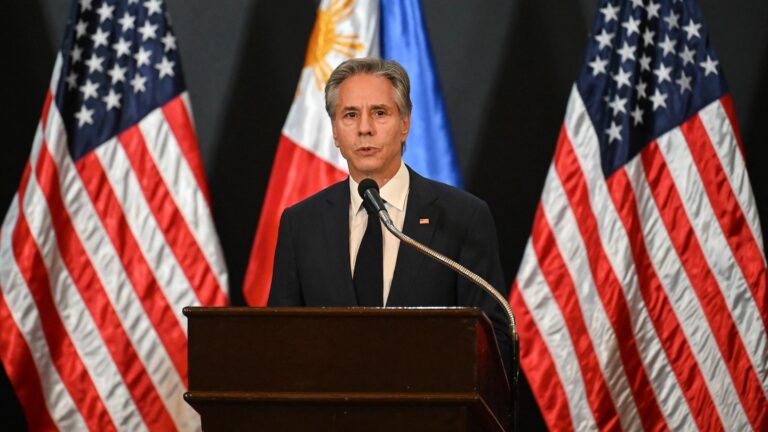Philippine President Ferdinand Marcos Jr. has nudged Manila in the U.S. direction since taking office in 2022, visiting the country four times, most recently in April. His predecessor, Rodrigo Duterte, was much friendlier toward China.
Secretary of State Antony Blinken and Secretary of Defense Lloyd Austin have crisscrossed Southeast Asia and East Asia in recent days, meeting with local leaders as the Biden administration continues to seek to bolster ties with countries concerned about China’s assertiveness. On Sunday, the two leaders deepened ties with Japan by announcing plans to modernize U.S. Forces Japan. Blinken is also scheduled to visit Singapore and Mongolia.
A Chinese coast guard vessel collided with and boarded a Philippine Navy vessel last month as it tried to resupply the warship Sierra Madre, which is stranded on a partially submerged reef known as Second Thomas Shoal and is a central point of contention between the two countries. The United States has a mutual defense treaty with the Philippines, and Biden administration officials have warned that a Chinese attack on Philippine vessels could provoke a U.S. military counterattack.
“We live in increasingly complex times,” Blinken told reporters Tuesday alongside Austin and his Philippine colleagues at a military base in Manila. With U.S. support, the Philippines “will be better prepared to defend its sovereignty. That’s what this is about.”
Since President Marcos took office, the United States has expanded economic and security assistance to the Philippines and stepped up intelligence sharing and other support to Manila. Philippine officials last year agreed to give U.S. troops access to four new bases across the country, helping expand U.S. military influence in the strategically vital region.
“The Indo-Pacific region is going to significantly rewrite world history over the next few years,” Biden said in April when he met with Marcos and Japanese Prime Minister Fumio Kishida in Washington, the first time the three leaders had met jointly.
The $500 million in military assistance is aimed at helping Philippine authorities modernize the armed forces and put more effort into foreign defense. The secretaries also agreed to boost investments in areas such as Philippine cybersecurity that could make the country more resilient against Chinese threats.
“Building a truly credible deterrent force is crucial to ensuring the rule of international law in the Indo-Pacific region,” Philippine Defense Secretary Gilbert Teodoro told reporters.
This is Secretary of State Blinken’s third visit to the Philippines and his second this year.
After last month’s incident near Second Thomas Shoal, China and the Philippines signed an agreement pledging to de-escalate confrontation, but fears remain that they could escalate again.
While the Biden administration has declared the Indo-Pacific region a priority and China its biggest long-term geostrategic challenge, it also faces high-profile foreign policy crises in other areas, including Russia’s invasion of Ukraine in 2022 and the conflict between Israel and Gaza that now threatens to escalate into a regional war.
Still, Blinken and Austin have made multiple visits to the region to address China’s expansion and deepen ties with Washington that have waxed and waned under successive presidential administrations.
“The force posture enhancements and reviews that we’ve been conducting in Japan, the Philippines, Australia and elsewhere are all part of a comprehensive effort to modernize our force posture in the region,” said a senior U.S. defense official, who spoke to reporters ahead of Tuesday’s meeting on condition of anonymity to discuss sensitive diplomatic considerations. “And the Philippines is certainly at the center of that.”
Vice President Harris has also built an unusually strong relationship with President Marcos since taking office, meeting him multiple times and building a close bond, her aides said. As part of her official 2022 visit, Harris visited a local fishing village in the western Philippine province of Palawan, where she met with fishermen who had been driven out of their traditional waters by Chinese vessels.
Residents have been watching Harris’ rapid rise with interest.
Jacqueline Lerata, a resident of Tagbros town on Palawan who spoke with Harris during the visit, recalled buying him a bag of danggit, a local dried fish, that he made to take back to Washington.
“She told me she was proud of me because I taught other women how to dry fish in the same way,” Lerata said.
Sophia Tomakurus contributed to this report.

